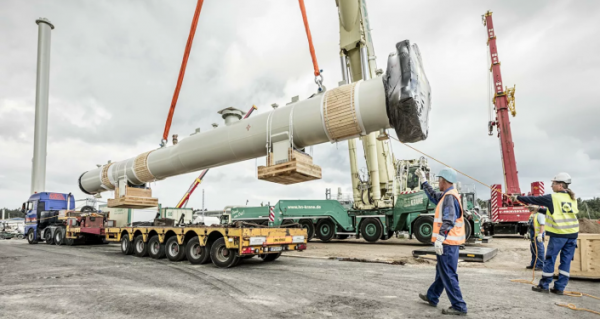
Poland has long been one of the most adamant opponents of the Nord Stream 2 gas pipeline project, urging its European neighbours to find alternatives to Russian pipeline gas – such as liquefied natural gas from the US, Qatar and Kuwait. Nord Stream 2’s proponents say that Russian gas is both cheaper and more environmentally friendly.
The Russian Embassy in Germany has responded to recent remarks by the Polish ambassador about Nord Stream 2’s alleged threat to Warsaw and the European Union, stressing that that the infrastructure megaproject is being implemented in full compliance with European legislation and for Europe’s own benefit.
Last week, Polish Ambassador Andrzej Przylebski urged Berlin and the European Union to take a tougher line on Russia, suggesting that Nord Stream 2 is problematic because it will supposedly allow Russia to receive huge sums of cash, which Moscow then pour into its military.
The diplomat went on to suggest that although Poles “have a great affinity for Russia”, including Russian music and films, Warsaw is “also prepared to fight [the Russians] if necessary”. Moscow, he said, “needs to come to its senses now”.
Responding to Przylebski’s remarks on Friday, the Russian Embassy suggested that the diplomat’s “belligerent rhetoric” and “openly hostile tone” were “both disappointing and disconcerting”, adding that “it seems that singing Russian songs and watching Russian movies have not taught him anything”.
According to the International Institute for Strategic Studies, Russia spent the equivalent of $60.6 billion on defence in 2020. For comparison, the United States alone spent over twelve times that during the same period, while NATO spent over a trillion dollars on defence, with alliance members making up six of the top fifteen spenders (and other US allies, including Japan, Saudi Arabia, South Korea, Australia and Israel accounting for most of the rest). Despite this spending, US and NATO officials have repeatedly reprimanded some countries, including Germany, for their failure to ramp up defence spending to a minimum of 2 percent of GDP.

Map of the major existing and proposed russian natural gas transportation pipelines to Europe
Poland has lobbied both the Trump and Biden administrations to “put an end” to Nord Stream 2, while begrudgingly recognising recently that the project will probably be finished.
Last week, Secretary of State Antony Blinken reiterated that “any entity” involved in Nord Stream 2 “risks US sanctions and should immediately abandon work on the pipeline”. Also last week, German media reported that EU nations and Germany in particular were growing increasingly disconcerted about Washington’s unilateralism and threats against Nord Stream 2.
The United States slapped two rounds of sanctions on the energy infrastructure megaproject in late 2019 and early 2021, prompting a major Swiss construction contractor and several insurers and certification firms to pull out. Major Russian and Western European energy companies have been undeterred, however, with Russian ships deployed to complete construction, apparently ignoring sanctions.
Nord Stream 2 is already about 95 percent complete, and when finished, will enable Russia to provide Western Europe with an additional 55 billion cubic meters of gas per year, doubling the capacity of the existing Nord Stream network. Along with Russia’s Gazprom, the $10.5 billion project has received funding from Germany’s Uniper and Wintershall, France’s Engie, Austria’s OMV and the Anglo-Dutch concern Royal Dutch Shell.
Sourse: sputniknews.com






